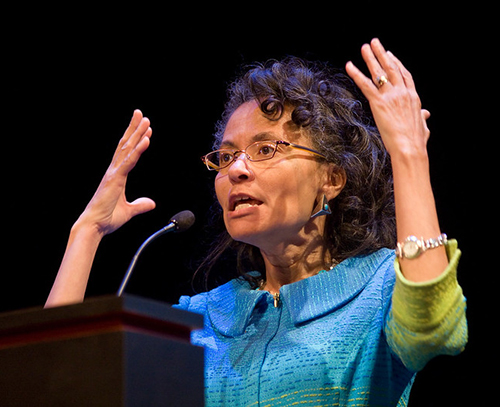Berkeley Talks: Fighting racism: How to restructure society so it’s open to all
Amani Allen from Berkeley's School of Public Health joined epidemiologist Camara Jones in a talk called "Racism: The ultimate underlying condition," the first of a webinar series by the American Public Health Association
June 26, 2020
Subscribe to Berkeley Talks, a Berkeley News podcast that features lectures and conversations at UC Berkeley.

In this talk, speaker Camara Jones defines racism as a two-sided open/closed sign — while those on the open side might not recognize the other side says “closed,” those on the outside are well-aware, she says. (Photo by Tim Mossholder via Unsplash)

Amani Allen is the executive associate dean of UC Berkeley’s School of Public Health. (Berkeley Public Health photo)
“Now, some would like us to believe that racism can be cured pharmacologically,” said Amani Allen, executive associate dean at UC Berkeley’s School of Public Health. “One major problem with this argument is that it suggests that racism is primarily facilitated through individual actors, and if we can just fix those bad people, everything will be fine. Well, racism, I would argue, won’t be cured by a pill. And that’s because what we’re talking about is systemic.”
On June 9, 2020, Allen joined epidemiologist and civil rights activist Camara Jones, a 2019-20 Evelyn Green Davis Fellow at the Radcliffe Institute for Advanced Study at Harvard University, in the first of a webinar series by the American Public Health Association that examines racism and its historic present-day impact on health and well-being.
In their talk, “Racism: The ultimate underlying condition,” Jones began by defining racism as a two-sided open/closed sign, and how those on the open side might not recognize that the other side says “closed.”

Camara Jones (King County, Washington photo via Flickr)
“… It is difficult for any of us to recognize a system of inequity that privileges us,” said Jones. “It is difficult for men, for example, to recognize male privilege and sexism. It is difficult for white Americans to recognize white privilege and racism. In fact, it’s difficult for all Americans to recognize our American privilege in the global context. But those on the outside are very well-aware of the two-sided nature of the sign…”
Next, Allen discussed the physiological impacts of racism and toxic stress on health — how prolonged circulation of stress hormones can become toxic and compromises the body’s ability to regulate key biological systems.
“In thinking about racism as a stressor,” she said, “the majority of African Americans report exposure to racial discrimination at some point in their lifetime, with most reporting multiple experiences. …We are being hit one after another after another, with repeated stress experiences that the end result is still prolonged elevation and circulation of stress hormones in the body.”
Listen to the full conversation, followed by a Q&A, in Berkeley Talks episode #86: “Fighting racism: How to restructure society so it’s open to all.”